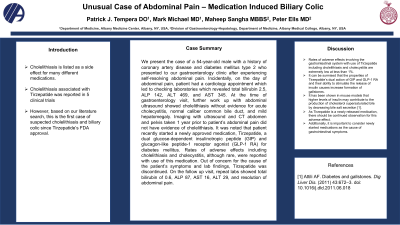Sunday Poster Session
Category: Biliary/Pancreas
P0143 - Unusual Case of Abdominal Pain - Medication Induced Biliary Colic
Sunday, October 22, 2023
3:30 PM - 7:00 PM PT
Location: Exhibit Hall

Has Audio

Patrick Tempera, DO
Albany Medical Center
Albany, NY
Presenting Author(s)
Patrick Tempera, DO, Maheep Sangha, MBBS, Peter Ells, MD, Mark P. Michael, MD
Albany Medical Center, Albany, NY
Introduction: Cholelithiasis is listed as a side effect for many different medications. Cholelithiasis associated with Tirzepatide was reported in 5 clinical trials, however, based on our literature search, this is the first case of suspected cholelithiasis and biliary colic since Tirzepatide’s FDA approval.
Case Description/Methods: We present the case of a 54-year-old male with a history of coronary artery disease and diabetes mellitus type 2 who presented to our gastroenterology clinic after experiencing self-resolving abdominal pain. Incidentally, on the day of abdominal pain, patient had a cardiology appointment which led to checking laboratories which revealed total bilirubin 2.5, ALP 142, ALT 469, and AST 345. At the time of gastroenterology visit, further work up with abdominal ultrasound showed cholelithiasis without evidence for acute cholecystitis, normal caliber common bile duct, and mild hepatomegaly. Imaging with ultrasound and CT abdomen and pelvis taken 1 year prior to patient’s abdominal pain did not have evidence of cholelithiasis. It was noted that patient recently started a newly approved medication, Tirzepatide, a dual glucose-dependent insulinotropic peptide (GIP) and glucagon-like peptide-1 receptor agonist (GLP-1 RA) for diabetes mellitus. Rates of adverse effects including cholelithiasis and cholecystitis, although rare, were reported with use of this medication. Out of concern for the cause of the patient’s symptoms and lab findings, Tirzepatide was discontinued. On the follow up visit, repeat labs showed total bilirubin of 0.6, ALP 87, AST 16, ALT 29, and resolution of abdominal pain.
Discussion: Rates of adverse effects involving the gastrointestinal system with use of Tirzepatide including cholelithiasis and cholecystitis are extremely low at less than 1%. Although the mechanism of action is not fully understood, it can be surmised that the properties of Tirzepatide’s dual action of GIP and GLP-1 RA and their ability to stimulate the release of insulin causes increase formation of gallstones. It has been shown in mouse models that higher levels of insulin may contribute to the production of cholesterol supersaturated bile by decreasing bile salt secretion [1]. As Tirzepatide is a newly released medication, there should be continued observation for this adverse effect. Additionally, it is important to consider newly started medications as the cause of gastrointestinal symptoms.
[1] Attili AF. Diabetes and gallstones. Dig Liver Dis. (2011) 43:672–3. doi: 10.1016/j.dld.2011.06.018
Disclosures:
Patrick Tempera, DO, Maheep Sangha, MBBS, Peter Ells, MD, Mark P. Michael, MD. P0143 - Unusual Case of Abdominal Pain - Medication Induced Biliary Colic, ACG 2023 Annual Scientific Meeting Abstracts. Vancouver, BC, Canada: American College of Gastroenterology.
Albany Medical Center, Albany, NY
Introduction: Cholelithiasis is listed as a side effect for many different medications. Cholelithiasis associated with Tirzepatide was reported in 5 clinical trials, however, based on our literature search, this is the first case of suspected cholelithiasis and biliary colic since Tirzepatide’s FDA approval.
Case Description/Methods: We present the case of a 54-year-old male with a history of coronary artery disease and diabetes mellitus type 2 who presented to our gastroenterology clinic after experiencing self-resolving abdominal pain. Incidentally, on the day of abdominal pain, patient had a cardiology appointment which led to checking laboratories which revealed total bilirubin 2.5, ALP 142, ALT 469, and AST 345. At the time of gastroenterology visit, further work up with abdominal ultrasound showed cholelithiasis without evidence for acute cholecystitis, normal caliber common bile duct, and mild hepatomegaly. Imaging with ultrasound and CT abdomen and pelvis taken 1 year prior to patient’s abdominal pain did not have evidence of cholelithiasis. It was noted that patient recently started a newly approved medication, Tirzepatide, a dual glucose-dependent insulinotropic peptide (GIP) and glucagon-like peptide-1 receptor agonist (GLP-1 RA) for diabetes mellitus. Rates of adverse effects including cholelithiasis and cholecystitis, although rare, were reported with use of this medication. Out of concern for the cause of the patient’s symptoms and lab findings, Tirzepatide was discontinued. On the follow up visit, repeat labs showed total bilirubin of 0.6, ALP 87, AST 16, ALT 29, and resolution of abdominal pain.
Discussion: Rates of adverse effects involving the gastrointestinal system with use of Tirzepatide including cholelithiasis and cholecystitis are extremely low at less than 1%. Although the mechanism of action is not fully understood, it can be surmised that the properties of Tirzepatide’s dual action of GIP and GLP-1 RA and their ability to stimulate the release of insulin causes increase formation of gallstones. It has been shown in mouse models that higher levels of insulin may contribute to the production of cholesterol supersaturated bile by decreasing bile salt secretion [1]. As Tirzepatide is a newly released medication, there should be continued observation for this adverse effect. Additionally, it is important to consider newly started medications as the cause of gastrointestinal symptoms.
[1] Attili AF. Diabetes and gallstones. Dig Liver Dis. (2011) 43:672–3. doi: 10.1016/j.dld.2011.06.018
Disclosures:
Patrick Tempera indicated no relevant financial relationships.
Maheep Sangha indicated no relevant financial relationships.
Peter Ells indicated no relevant financial relationships.
Mark Michael indicated no relevant financial relationships.
Patrick Tempera, DO, Maheep Sangha, MBBS, Peter Ells, MD, Mark P. Michael, MD. P0143 - Unusual Case of Abdominal Pain - Medication Induced Biliary Colic, ACG 2023 Annual Scientific Meeting Abstracts. Vancouver, BC, Canada: American College of Gastroenterology.
